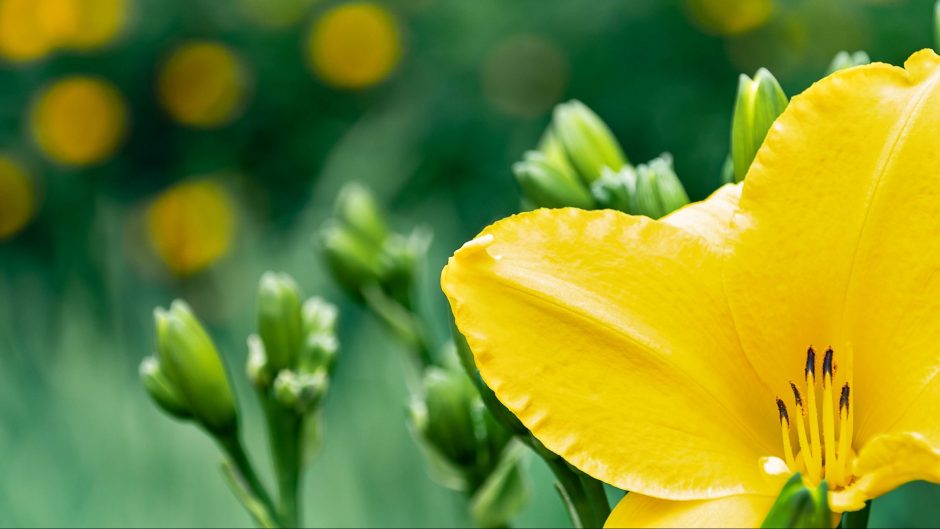Daylilies (Hemerocallis spp.) are some of the most popular perennial garden plants, prized for their profusion of colorful blooms throughout the summer But what colors do daylilies actually come in?
When daylilies first became popular as garden plants in the early 20th century, the color range was quite limited. Most of the early hybrids were in tones of yellow, gold, and orange, which are the predominant colors seen in daylily species.
Over the last several decades, skilled hybridizers have vastly expanded the daylily color palette. Nowadays, they are available in a kaleidoscopic array of gorgeous hues. Let’s take a look at the full spectrum of daylily colors you can grow in your garden.
Vibrant Yellows
Yellow is the classic daylily color. Many species daylilies like Hemerocallis lilioasphodelus and H. citrina bear bright lemon yellow flowers. Early hybrids tended to be in rich golden yellow shades too.
Even today, sunny yellow remains one of the most popular and widely available daylily colors There are clear light yellows, bold sunflower yellows, and mellow old gold tones. Yellows blend beautifully with other colors and brighten up any garden bed.
Fiery Oranges and Reds
Daylilies look stunning in hot fiery shades. Brick reds, scarlet, vermilion, and neon orange colors make a bold visual statement. They seem to glow when planted en masse.
Red daylily hybrids like ‘Frances Joiner’ and ‘Sultan’s Palace’ make an intense color impact. Blends of red and orange, like ‘Jamaican Me Crazy’, have a tropical look. For softer red tones, try apricot or salmon shades.
Cool Pastels
On the opposite end of the spectrum from fiery reds are the cool pastel daylily shades. These include creamy ivory, blush pink, lavender, pale yellow, and melon. The flowers have a delicate, romantic look.
Pastel daylilies are perfect for cottage gardens and mixing with other pastel flowering perennials. Some great choices are ‘Bela Lugosi’, ‘Lavender Blue Baby’, and ‘Pink Damask’.
Luscious Pinks
From pale to neon, pink is another diverse category of daylily colors. There are light peachy pinks, bubblegum pink, rose pink, and deep fuchsia. Many pink daylilies also feature contrasting purple or red eyes and edges.
A few pink beauties to consider are ‘Elizabeth Salter’, ‘Cranberry Baby’, ‘Ruby Spider’, and ‘Double Pom Pom Pink’. Plant different shades of pink together for a lively effect.
Regal Purples
The daylily world has bred some absolutely gorgeous flowers in shades of purple, lavender, plum, lilac, and violet. Add some mysticism to your garden with these moody hues.
Check out ‘Purple Spider’, ‘Royal Purple’, or ‘Bela Lugosi’ for a deeply saturated purple. For a lighter touch, grow pale lilac ‘Lavender Blue Baby’ or ‘Lavender Pom Poms’.
Crisp Whites
Pure snowy white daylilies are still quite rare, but there are now many near-white cultivars available. Creamy whites and pale greenish tones evoke an ethereal elegance.
Stunning off-white choices include ‘Sunday Gloves’, ‘Custard Candy’, and ‘Moonlit Masquerade’. Plant them with cool pastels for a heavenly pairing.
Exotic Bicolors
Why choose just one daylily color when you can have two? Hundreds of named cultivars are bicolored or multicolored blends. Contrasting edges, variable throats, and color gradients create exciting effects.
Some beautiful bicolor varieties are ‘Ruby Spider’, ‘Cranberry Baby’, ‘Bela Lugosi’, and ‘Jamaican Me Crazy’. Have fun mixing these with solid colors for added pop.
Rare and Unusual Colors
Innovative hybridizers keep pushing the daylily color boundaries with rare hues and color combinations. Some examples include smoky purples, slate blues, and even green tones.
Cutting-edge shades can be found in ‘Blueberry Candy’, ‘Blue Eyed Soul’, ‘Green Flutter’, and ‘Mort Moro’. Check specialty growers for the newest color breakthroughs.
Choosing Colors for Impact
With so many gorgeous daylily colors available, how do you choose? Here are a few tips:
- Yellows and oranges energize a space and contrast well with blues and purples
- Reds and hot colors make a bold statement, especially in mass plantings
- Pastels have a soothing effect and mix nicely with other perennials
- Dark purple and red daylilies create drama and mystery
- Near whites and pale colors feel elegant and light up the night garden
- Bicolors and unusual shades provide excitement and intrigue
Take into account the existing colors in your garden so you can find hues that complement each other. Visiting local gardens and nurseries is a great way to see colors in person before choosing. With daylilies, you’re guaranteed to find colors that brighten your landscape and fit your style.
The Ever-Expanding Spectrum
Daylily hybridizers continue to push the color boundaries, so we can expect even more choice in the future. Perhaps we’ll see deeper blues, true greens, black daylilies, or even multicolor “rainbow” blooms.
One thing is for sure – daylily flowers will continue to amaze us with their sensational colors. Any garden can benefit from adding these low-maintenance, floriferous perennials. With such a rainbow to choose from, you’re sure to find perfect shades for your landscape.
How to Choose Daylily Colors
FAQ
What is the most sought after daylily?
Which daylilies bloom all summer long?
Do daylilies prefer sun or shade?
- A Complete Guide to Caring for Yuki Cherry Blossom Shrub - January 23, 2025
- Identifying Red Hot Poker Seeds: What to Look For When Harvesting Torch Lily Pods - January 23, 2025
- A Complete Guide to Harvesting Evening Primrose Seeds - January 23, 2025

